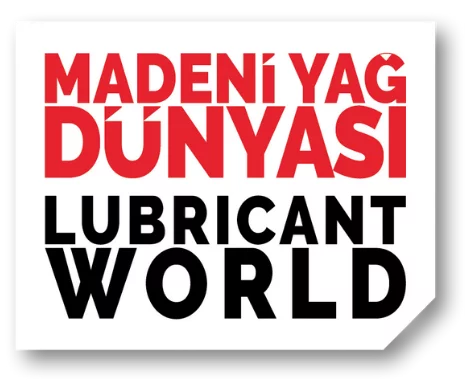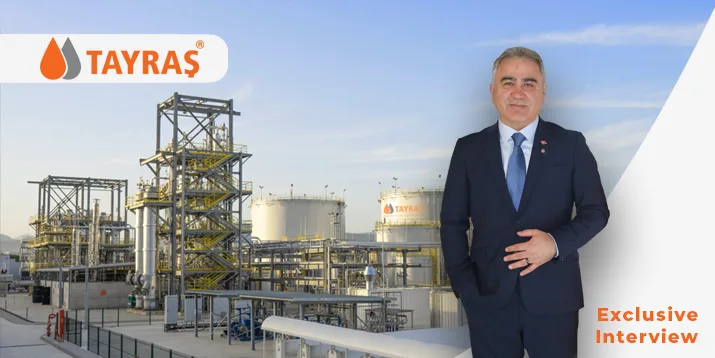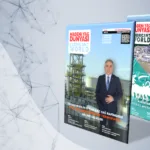TAYRAŞ, a leader in producing base oil from end-of-life lubricants using hydro-processing technology, operates Turkey’s first and only facility of its kind, and the second largest globally. The company is on the brink of a significant breakthrough.
In 2025, TAYRAŞ plans to increase the processing capacity of its Bilecik refinery from 60,000 tons to 140,000 tons per year. This new investment will not only enhance refining capacity and launch green hydrogen and green base oil production but also elevate production and product quality, thanks to the innovative efforts of Turkish engineers.
The existing Bilecik facility has been redesigned as a circular Technopark, emphasizing re-refining in terms of production volume, high technology, and product quality. This strategic move will further solidify TAYRAŞ’s pioneering role in the transition to a circular economy. During our visit to Mehmet Afşin, TAYRAŞ Chairman of the Board, we shared the excitement of this new investment and gathered valuable insights that will steer the future of the lubricants industry.
Can you tell us about TAYRAŞ’s leading role in the transition to a circular economy?
Recycling, recovery, waste management, and decarbonization have become critical global agenda items for the sustainability of both ecological and economic systems. At TAYRAŞ, we are dedicated to ensuring that these new dynamics of global economy are recognized, adopted, and deeply understood in our country, which is integrated into the global economy. We founded TAYRAŞ with this vision and strategic perspective. We have aligned all our internal and external dynamics to realize this vision and communicated it to all our colleagues and stakeholders. Today, we devote all our time, work energy, and priorities to developing and advancing TAYRAŞ’s vision of “Upcycling, bettering the future”.
Since our establishment, we have made significant strides each year, writing new success stories with every step. Our achievements stem from our passion for our work and the vision we have embraced. TAYRAŞ is more than just a facility or an exemplary business for circular economy; it is a passion that shapes our work culture and even our way of life. TAYRAŞ brings us great joy as a valuable asset to our country. TAYRAŞ is a facility where dreams transform into vision, vision into passion, and passion into action. TAYRAŞ is an important gain for our country. We take pride in being a source of inspiration and a model of best practices for our stakeholders, as we prepare our country and our sector for a circular economy.
What are the tangible contributions of TAYRAŞ to the sustainability of the ecological and economic system?
In industrial engineering, it is often said that it takes five years for a process to become fully operational and efficient. However, we at TAYRAŞ have achieved this in much less time, thanks to our hard work and discipline. We began production in 2022 and underwent significant transformations in 2023 and 2024, leading to a highly successful year in terms of production. In 2023, our direct contribution to the national budget through SCT and VAT amounted to $40 million. This was achieved by creating value from oils that had reached the end of their service life. We anticipate increasing this contribution significantly in 2024.
Annually we import around 650-700 thousand tons of base oils, which are the main raw material of the lubricants industry. By converting this imported product into a high-quality product domestically using our own resources, we help reduce the current account deficit. If not managed properly, waste lubricants will harm the soil, water, air, and eventually the future of our planet. Collecting this waste as it should be, processing it using advanced technologies, and transforming it into high-value-added products exemplifies a circular economy approach that demands significant organizational capacity and coordination skills.
By preventing carbon emissions that have an impact on climate change, we provide substantial benefits for the future of our planet. Additionally, our efforts contribute significantly to the national economy through tax revenue and by reducing the current account deficit. Above all, we are committed to creating a clean and liveable world. Leveraging its expertise, TAYRAŞ’s base oils production significantly contributes to the lubricants sector’s decarbonization targets and sustainability reports, boasting a low carbon footprint of up to 70%.
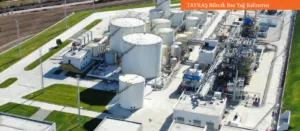
What will be the priority issue on TAYRAŞ’s agenda in 2025?
Since our establishment, we have made continuous progress and achieved new breakthroughs each year. We are excited to announce a new initiative that will further solidify TAYRAŞ’s leading role in 2025. Currently, our country generates approximately 300-350 thousand tons of end-of-life lubricants annually. It is crucial for us to collect and re-refine these oils in compliance with legislation and circular economy principles. As the only refinery in our country producing Group II base oils, we bear a significant responsibility. To meet this challenge, we have decided to expand our waste processing capacity from 60 thousand tons per year with the addition of a new facility.
Our current site is located on a 150,000 sqm plot. This site already has the necessary technical infrastructure, collection mechanisms, logistics facilities, railway connections, and shipping networks. We constructed our first facility with future expansion in mind, designing the infrastructure to support second and third facilities. Therefore, we will launch the second facility in 2025, leveraging our existing technical, logistical, and financial resources. This expansion will more than double our refining capacity from 60,000 tons to 140,000 tons per year, enabling us to process more waste lubricants.
However, this expansion is not merely about increasing capacity or adding a new unit to the existing facility. Alongside the capacity increase, we are implementing innovations to enhance the technical features of the current facility and improve product quality. Importantly, these advancements are being achieved not through technology transfer, but through the ingenuity of our engineers and young talent. With a budget of $55 million, the new facility will enable us to produce a “green product” developed entirely by our Turkish engineers, in addition to Group II, Group II+, and Group III base oils.
Therefore, at TAYRAŞ, we will achieve both quantity and quality enhancements with our new facility, leveraging our knowledge and experience. This $125 million complex will be a landmark in the world of recycling, distinguished not only by its processing capacity but also by its advanced technology and infrastructure. We can describe this facility as a Technopark dedicated to re-refining. It stands as a proud value for our country, and we are happy and honored to pioneer this initiative. We hope to see more such investments in our country.
Spot: With its second refinery project, TAYRAŞ is investing an additional 55 million dollars to transform its base oil refinery in Bilecik into a Technopark dedicated to re-refining. This project will more than double TAYRAŞ’s refining capacity from 60,000 tons to 140,000 tons per year, and integrate it with green hydrogen production. It is set to begin in the first quarter of 2025.
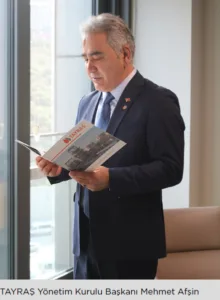
Is TAYRAŞ’s sustainability approach reflected in other stages of the production process?
Environmental awareness, efficiency, and creating added value are integral to all our operational processes as part of our zero-waste culture. In the industry, if you do not adopt these principles and ensure quality production, you cannot develop, compete, or break free from a vicious cycle. Every work we perform is based on knowledge, experience, and qualified staff. When we talk about “circular products” or “green production”, these concepts must be translated into tangible actions. Every stage of the product life cycle—from packaging to logistics, and the clean energy (renewable energy) we use—must be analyzed and designed with a zero-waste approach to minimize carbon emissions.
We now know that the base oil we produce results in 70,000 tons less carbon emissions per year compared to base oil derived from petroleum, and 70% less emissions. However, we are not content with just this achievement. We have organized our logistics processes to further minimize carbon emissions, creating significant employment opportunities in the process. Our nationwide logistics network includes used lubricant collection points, 36 wagons operating under Turkish State Railways (TCDD), and over 90 collection tankers in various categories. With our own 2 km train line, we can efficiently transfer materials within our facility, ensuring the entire process is conducted in a healthy, safe, and environmentally friendly manner.
Therefore, all our operations align with the principles of the circular economy. Sustainability has become a way of life for us. However, this commitment should not be limited to TAYRAŞ or a few businesses genuinely practicing circularity; it should become a widespread culture across the entire industry and society. Unfortunately, recycling often remains a topic of discussion rather than action in our culture. We must address waste management as an educational issue. It is essential to teach the importance of recycling from a young age, starting with basic education, and to increase the number of trained professionals in this field.
“As Türkiye, we must ensure our Industry’s self-suffIcIency through qualIty productIon. We need to cultIvate the awareness that everythIng regarded as waste Is a crucIal and valuable raw materIal. SocIety must understand that products can be transformed Into productIon Inputs after their lIfespan ends. The Industry, as a major producer of waste, should actIvely support cIrcular projects.”
Has the understanding of sustainable production in our industry, and specifically in our lubricant sector, developed sufficiently?
Global warming and climate change are critical issues on the global agenda. Documents such as the UN Sustainable Development Goals, the European Union Green Deal, and the Paris Agreement outline targets to address these challenges. As a member of the global community, our country has implemented legislative regulations reflecting these international commitments. Consequently, we observe a transformation across all sectors, particularly the waste industry, towards sustainable practices, driven by the need to trade globally, have competitive power, and comply with legislation.
However, this change must be managed at an internationally recognized level, without misusing it or turning to informal practices. Qualified investment is essential for achieving qualified production in the industry. Simply complying with one aspect of the production process while neglecting others does not result in environmentally friendly production, and the global system will recognize this discrepancy. Financial institutions typically want to have these three fundamental issues for qualified investments: Source of raw materials, production methods, and market. These issues essentially outline the product life cycle. If you cannot complete this cycle in a healthy and environmentally friendly manner, you will not secure qualified financing. Therefore, our industrialists must understand that this process begins with the raw materials.
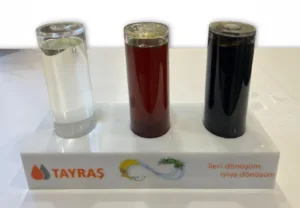
Do you have a special message for the lubricants industry on sustainability?
The lubricants industry should actively support investments in sustainability. This is crucial not only for transitioning to a circular economy and integrating with global standards but also for ensuring fair competition within the lubricants market. Informal businesses may introduce low-quality products to the market, creating unfair competition and negatively impacting those who adhere to proper practices, ultimately undermining the market. If more structures like TAYRAŞ emerge, it will pave the way for qualified industrialization in the lubricants sector, fostering a healthier and more competitive market environment.
I would like to emphasize the importance of correctly understanding the blending concept in our industry. The regulation mandates a 4% blending rate, yet there are misconceptions and misinformation surrounding this requirement. We need to address this issue on a global scale. To establish qualified production facilities and benefit the national economy, the Industrial Development Projects initiated by the Ministry of Industry must be supported. Encouraging the use of high-quality and high-value-added products produced with modern technologies is crucial. While global-scale companies and institutionalized manufacturers are sensitive to this issue, many businesses in the lubricant sector disregard legislation and lack the same sensitivity. Additionally, authorized institutions may not sufficiently inspect and monitor the organizations. However, as I mentioned, establishing such qualified production facilities requires strict compliance with legislation and effective inspections. As TAYRAŞ, we continue our negotiations to ensure that such issues are monitored more closely.
Instead of allowing end-of-life products to harm the environment, we repurpose them, effectively transforming them into national assets and adding value. As an alternative to high-carbon products imported from abroad and paid in foreign currency by the lubricants sector, we offer high-quality, high-value-added products with a low carbon footprint, produced domestically, and delivered with exceptional service.
TAYRAŞ significantly contributes to science and technology by developing its own human resources in line with its visionary approach. Qualified employment is a necessity for qualified production. We have valuable young talents whom we value and instil with a sense of responsibility. We send our young engineers to national and international training programs and scientific events, ensuring they develop to global standards. This staff consists of our graduates and today they both work at TAYRAŞ and provide technological support to technically advanced countries. Therefore, TAYRAŞ contributes to both the present and future of our country with its internationally recognized structure, which elevates the overall quality of the sector.
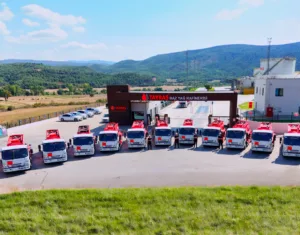
By producing base oil, the primary raw material for lubricants, with its own resources, TAYRAŞ offers an alternative to imports, helps reduce the current account deficit, and generates foreign exchange through exports. With 20% of its production exported to developed European countries, TAYRAŞ is globally recognized for its product quality.
TAYRAŞ’s facility in Bilecik is distinguished by its exceptional logistics capabilities. By minimizing the carbon footprint during the transfer of end-of-life lubricants, TAYRAŞ works with 36 wagons and over 90 collection tankers in its operations. Oils collected from various centers across the country are transported to the facility via a dedicated 2 km train line owned by TAYRAŞ.
